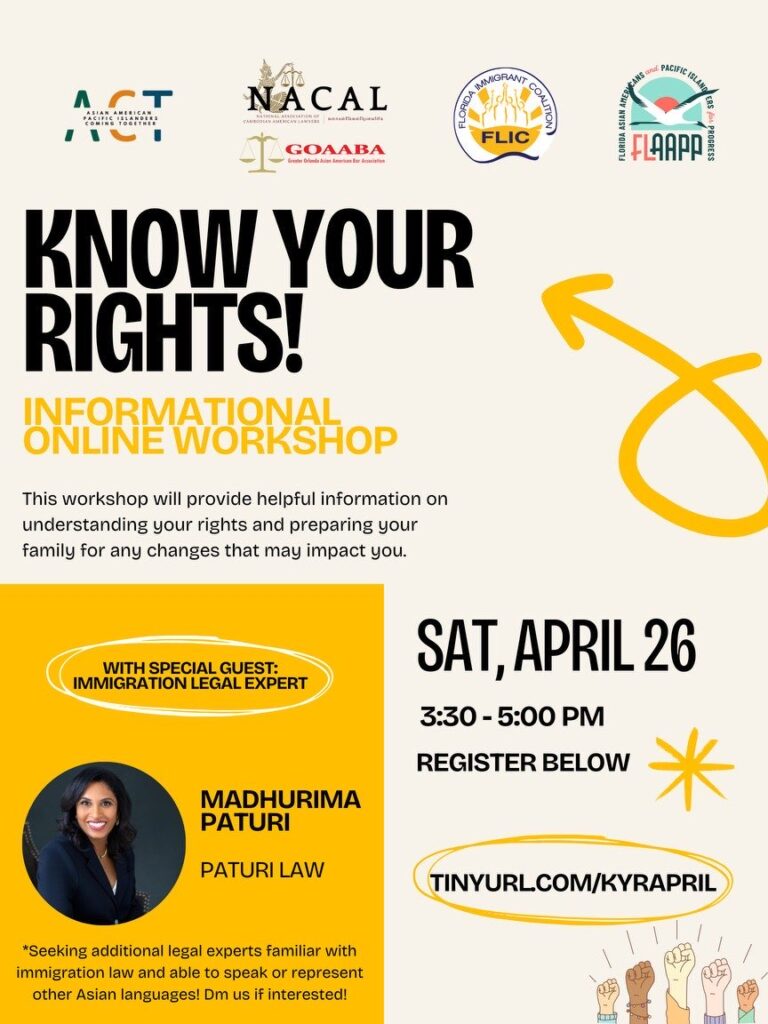Create your own packet
What is a Family Preparedness Plan?
The Family Preparedness Plan is a safety plan to help families in case someone is detained and is at
risk of deportation. This packet will help you to prepare your own Dignity Plan by knowing your
constitutional rights, having a list of emergency contacts and by gathering important documents
that can help your attorney to respond promptly if needed.
Know your Rights
Your rights are protected by the U.S. Constitution, regardless of your country of origin or
immigration status.
– DO NOT OPEN THE DOOR if an immigration agent is knocking on the door.
– DO NOT ANSWER ANY QUESTIONS from an immigration agent if they try to talk to you. You have the right to remain silent.
– DO NOT SIGN ANYTHING without first speaking to a lawyer. You have the right to speak
with a lawyer. If you are outside of your home, ask the agent if you are free to leave and if they say yes,
leave calmly.
What should I say if I am stopped by ICE or the police?
“I do not wish to speak with you, answer your questions, or sign or hand you any documents based on my 5th Amendment rights under the United States Constitution. I do not give you permission to enter my home based on my 4th Amendment rights under the United States Constitution unless you have a warrant to enter, signed by a judge or magistrate with my name on it that you slide under the door. I do not give you permission to search any of my belongings based on my 4th Amendment rights. I choose to exercise my constitutional rights.”
Personal Emergency Contacts
| Type of Contact | Purpose | Contact |
| Primary Emergency Contact | Person who can be contacted in case of emergencies. Someone who knows you and is close enough (family member or trusted friend, neighbor) | Name: Phone: Email: Address: |
Lawyer | Lawyer who is representing you or has represented you in the past | Name: Phone: Email: Address: |
Consulate | They can help in emergency cases | Name: Phone: Email: Address: |
Childcare support | Person who can help to take care of your children | Name: Phone: Email: Address: |
Employer | Person who needs to be notified in case you miss work or if you have unpaid wages | Name: Phone: Email: Address: |
Florida Immigrant Coalition Hotline
Report issues, get reliable information or access support
1-888-600-5762
info@flic.org
Documents Checklist
Documents should be stored in a safe place and should be easily accessed by your Primary Emergency Contact. Make sure to place a checkmark in each item that you have and to reviewthese documents with your Primary Emergency Contact
Personal Documents
❒ Birth Certificate
❒ Household Documents/ Mortgage
documents
❒ Consular ID
❒ Taxes and IRS records
❒ Passport
❒ Rent Agreement and Receipts
❒ Any other ID document
Such as identification cards issued by school,
employer, or community association
❒ Victim Documents
Such as police record showing that you have
been a victim of crime
❒ Diplomas & Certificates
❒ Business Papers
❒ Marriage License
❒ Criminal Records
❒ Medical Records
Such as list of prior surgeries or medical
history, copies of specialized tests or
prescriptions
❒ Collaborator Documents
Such as paperwork proving that you are a
witness to a crime in the United States and are
cooperating in an investigation
❒ Immigration Records
❒ Military Enlistment Papers
Family Documents
❒ Children’s Birth Certificates
❒ Diplomas & Certificates
❒ Children’s Passports
❒ Immigration Records
❒ Power of Attorney
A legal document giving power of attorney
(authority to act for another person in
specified or all legal or financial matters).
❒ Children’s Medical Records
Such as list of prior surgeries or medical
history, copies of specialized tests or prescriptions
What should you do if a loved one is detained by ICE?
Have all biographical information handy, including birth date and Alien Number (if they
have one).
- Have all biographical information handy, including birth date and Alien Number (if they
have one). - Try to remain calm. It may take up to 24 hours for your loved one’s name to show up in ICE
or private vendor databases. As soon as they are processed they will call you. Please know
that you will have to answer yes to a series of prompts to accept a call from a resident of a
detention camp. The prompts may not be in your first language. - You can try to locate your loved one using the following databases:
a. Use the ICE Locator: Search by Alien Number and Country of Birth work best. If
the alien number is not available try Name, Birthdate, and Country of Origin. Try
several variations of the name as it must be an exact fit.
https://locator.ice.gov/odls/#/search
b. Use Commissary and Phone Vendors: Once you locate your loved one, you can
deposit funds into their account so they can call you. www.gettingout.com or
www.accesscorrections.com
c. If your loved one is detained in South Florida they will most likely be at either the
Broward Transitional Center in Pompano Beach or the Krome Service Processing
Center in West Miami Dade. - Hire an immigration attorney if you can. Proceed with caution – always ask:
a. Is the attorney experienced in the immigration issues facing your loved one and is
the attorney willing to travel to the detention center?
b. Get the payment details and amounts in writing. This is called a retainer. Know
what you are paying for. For example, are you hiring the lawyer to petition and be
present for a bond hearing or for the entire case? Please know that appeals are
almost never included in the initial retainer. - Request a bond if your loved one is eligible for one. Insist that the attorney request one
right away. In addition to freedom, this will get your loved one’s immigration case
transferred to an immigration court outside of the detention center, where the odds of a
good result are better. - If you do not have funds to hire an attorney or need additional support, call the FLIC
Hotline at 1-888-600-5762 – leave a message if your agents are unavailable. FLIC will
share the case with a group of attorneys who do not charge their clients who may be able
to help. - Your support of a loved one in immigration detention is vital. Letters, pictures, and
money for calls home mean the world. Your job is to help ease the isolation. You have the
power to make a horrible situation a little less bad.



